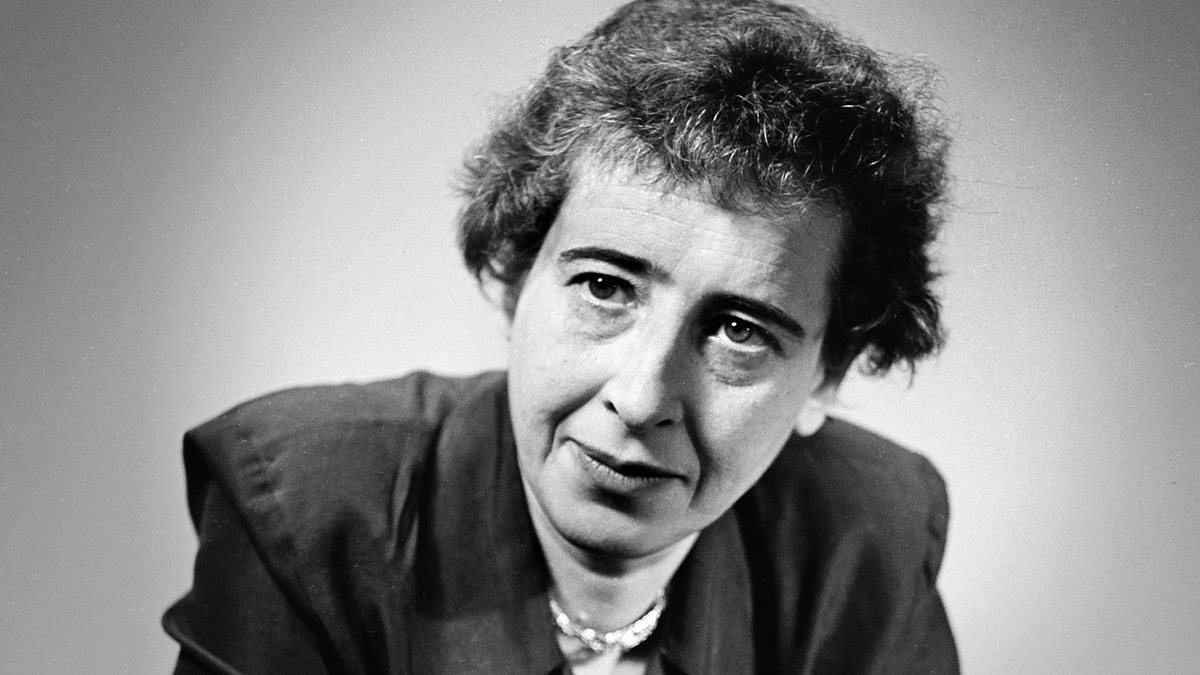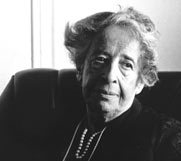__Hannah Arendt__ ( 14 October 1906– 4 December 1975), was a German-born American political philosopher. Her many books and articles have had a lasting influence on political theory and philosophy. Arendt is widely considered one of the most important political thinkers of the 20th century - wikipedia ![]()

Arendt was born in Linden-Limmer in 1906, to a Jewish family. At the age of three, her family moved to Königsberg, the capital of East Prussia, so that her father's syphilis could be treated. Paul Arendt had contracted the disease in his youth, and it was thought to be in remission when Arendt was born. He died when she was seven.
Arendt was raised in a politically progressive, secular family. Her mother was an ardent supporter of the Social Democratic Party of Germany. After completing her secondary education in Berlin, she studied at the University of Marburg under Martin Heidegger, with whom she had a brief affair. She obtained her doctorate in philosophy writing on ''Love and Saint Augustine'' at the University of Heidelberg in 1929 under the direction of the Existentialism philosopher, Karl Jaspers.
https://open.live.bbc.co.uk/mediaselector/6/redir/version/2.0/mediaset/audio-nondrm-download/proto/https/vpid/p06k5yyv.mp3
BBC Radio 4 - In Our Time, Hannah Arendt (Summer Repeat). Melvyn Bragg and guests discuss the ideas of Hannah Arendt, political philosopher - bbc ![]()
Hannah Arendt married Günther Stern in 1929, but soon began to encounter increasing antisemitism in 1930s Nazi Germany. Adolf Hitler came to power in 1933, and while researching antisemitic propaganda for the Zionist Federation of Germany in Berlin that year, Arendt was arrested for collected antisemitic research at the Prussian State Library and briefly imprisoned by the Gestapo.
On release, she fled Germany, living in Czechoslovakia and Switzerland before settling in Paris. There she worked for Youth Aliyah, assisting young Jews to emigrate to the Mandatory Palestine (now Israel).

Hannah Arendt. German-American Jewish philosopher and political theorist
- wikimedia ![]()
Divorcing Stern in 1937, she married Heinrich Blücher in 1940, but when Germany invaded France in 1940 she was detained by the French as an alien, despite having been stripped of her German citizenship in 1937.
She escaped and made her way to the United States in 1941 via Portugal. She settled in New York, which remained her principal residence for the rest of her life. She became a writer and editor and worked for the Jewish Cultural Reconstruction, becoming an American citizen in 1950.
With the publication of The Origins of Totalitarianism in 1951, her reputation as a thinker and writer was established and a series of works followed. These included the books The Human Condition (book) in 1958, as well as Eichmann in Jerusalem and On Revolution in 1963. She taught at many American universities, while declining tenure-track appointments. She died suddenly of a Myocardial infarction in 1975, at the age of 69, leaving her last work, The Life of the Mind, unfinished.
Her works cover a broad range of topics, but she is best known for those dealing with the nature of power (sociology) and evil, as well as politics, direct democracy, authority, and totalitarianism.
In the popular mind she is best remembered for the controversy surrounding the trial of Adolf Eichmann, her attempt to explain how ordinary people become actors in totalitarian systems, which was considered by some an apologia, and for the phrase "the banality of evil".
She is commemorated by institutions and journals devoted to her thinking, the Hannah Arendt Prize for political thinking, and on stamps, street names and schools, amongst other things.
# Work
Arendt wrote works on intellectual history as a philosopher, using events and actions to develop insights into contemporary totalitarian movements and the threat to human freedom presented by scientific abstraction and bourgeois morality. Intellectually, she was an independent thinker, a loner not a "joiner", separating herself from schools of thought or ideology - wikipedia ![]()
Crises of the Republic In "On Violence" Arendt substantiates that violence presupposes power which she understands as a property of groups. Thus, she breaks with the predominant conception of power as derived from violence - wikipedia ![]()
# Sections
# See also